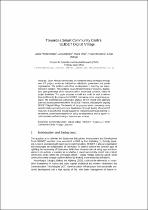JavaScript is disabled for your browser. Some features of this site may not work without it.
- ResearchSpace
- →
- Research Publications/Outputs
- →
- Conference Publications
- →
- View Item
| dc.contributor.author |
Phahlamohlaka, Letlibe J

|
|
| dc.contributor.author |
Dlamini, Z

|
|
| dc.contributor.author |
Mnisi, T

|
|
| dc.contributor.author |
Mashiane, T

|
|
| dc.contributor.author |
Malinga, Andries L

|
|
| dc.date.accessioned | 2015-03-12T09:54:01Z | |
| dc.date.available | 2015-03-12T09:54:01Z | |
| dc.date.issued | 2014-07 | |
| dc.identifier.citation | Phahlamohlaka, J, Dlamini, Z, Mnisi, T, Mashiane, T and Malinga, L. 2014. Towards a Smart Community Centre: SEIDET Digital Village. 11th IFIP TC 9 International Conference on Human Choice and Computers, HCC11 2014, Turku, Finland, 30 July - 1 August 2014, pp 1-15 | en_US |
| dc.identifier.isbn | 978-3-662-44207-4 | |
| dc.identifier.uri | http://hdl.handle.net/10204/7921 | |
| dc.description | 11th IFIP TC 9 International Conference on Human Choice and Computers, HCC11 2014, Turku, Finland, 30 July - 1 August 2014 | en_US |
| dc.description.abstract | South African communities are constantly being developed through new ICT projects which are initiated by individuals, government and private organisations. The problem with these developments is that they are implemented in isolation. This isolation causes limited sharing of resources, duplication, poor-governance of the resources and in worse-case scenarios, failure of project initiatives. This paper proposes a model that could be used to address these problems by focusing on the SEIDET community centre using it as an ex-ample. The model follows a descriptive analysis of ICT related work spanning over two decades performed within the SEIDET context, including the ongoing SEIDET Digital Village. The benefits of the proposed smart community centre model include community and rural development through sharing of scarce ICT resources. It could further provide support for entrepreneurs through training interventions, action-based research for policy development as well as spawn local innovation and free-sharing of resources and services. | en_US |
| dc.language.iso | en | en_US |
| dc.publisher | International Federation for Information Processing 2014 | en_US |
| dc.relation.ispartofseries | Workflow;13991 | |
| dc.subject | Community Centres | en_US |
| dc.subject | SEIDET | en_US |
| dc.subject | Smart Community Centres | en_US |
| dc.subject | Village Operators | en_US |
| dc.subject | Digital Villages | en_US |
| dc.subject | Siyabuswa | en_US |
| dc.title | Towards a Smart Community Centre: SEIDET Digital Village | en_US |
| dc.type | Conference Presentation | en_US |
| dc.identifier.apacitation | Phahlamohlaka, L. J., Dlamini, Z., Mnisi, T., Mashiane, T., & Malinga, L. (2014). Towards a Smart Community Centre: SEIDET Digital Village. International Federation for Information Processing 2014. http://hdl.handle.net/10204/7921 | en_ZA |
| dc.identifier.chicagocitation | Phahlamohlaka, Letlibe J, Z Dlamini, T Mnisi, T Mashiane, and L Malinga. "Towards a Smart Community Centre: SEIDET Digital Village." (2014): http://hdl.handle.net/10204/7921 | en_ZA |
| dc.identifier.vancouvercitation | Phahlamohlaka LJ, Dlamini Z, Mnisi T, Mashiane T, Malinga L, Towards a Smart Community Centre: SEIDET Digital Village; International Federation for Information Processing 2014; 2014. http://hdl.handle.net/10204/7921 . | en_ZA |
| dc.identifier.ris | TY - Conference Presentation AU - Phahlamohlaka, Letlibe J AU - Dlamini, Z AU - Mnisi, T AU - Mashiane, T AU - Malinga, L AB - South African communities are constantly being developed through new ICT projects which are initiated by individuals, government and private organisations. The problem with these developments is that they are implemented in isolation. This isolation causes limited sharing of resources, duplication, poor-governance of the resources and in worse-case scenarios, failure of project initiatives. This paper proposes a model that could be used to address these problems by focusing on the SEIDET community centre using it as an ex-ample. The model follows a descriptive analysis of ICT related work spanning over two decades performed within the SEIDET context, including the ongoing SEIDET Digital Village. The benefits of the proposed smart community centre model include community and rural development through sharing of scarce ICT resources. It could further provide support for entrepreneurs through training interventions, action-based research for policy development as well as spawn local innovation and free-sharing of resources and services. DA - 2014-07 DB - ResearchSpace DP - CSIR KW - Community Centres KW - SEIDET KW - Smart Community Centres KW - Village Operators KW - Digital Villages KW - Siyabuswa LK - https://researchspace.csir.co.za PY - 2014 SM - 978-3-662-44207-4 T1 - Towards a Smart Community Centre: SEIDET Digital Village TI - Towards a Smart Community Centre: SEIDET Digital Village UR - http://hdl.handle.net/10204/7921 ER - | en_ZA |






